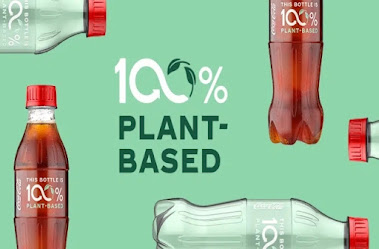Coca Cola launches a bottle made from 100% plant-based plastic

PET, the world’s most recycled plastic, comprises two molecules: approximately 30% monoethylene glycol (MEG) and 70% terephthalic acid (PTA). The original PlantBottle™, introduced in 2009, includes MEG from sugarcane, but the PTA has been from oil-based sources until now. PlantBottle™ packaging looks, functions and recycles like traditional PET but has a lighter footprint on the planet and its resources.
Coca-Cola's new prototype plant-based bottle is made from plant-based paraxylene (bPX) - using a new process by Virent - which has been converted to plant-based terephthalic acid (bPTA). As the first beverage packaging material resulting from bPX produced at demonstration scale, this new technology signals a step-change in the commercial viability of the biomaterial. The bPX for this bottle was produced using sugar from corn, though the process lends itself to flexibility in feedstock.
In 2015, Coca-Cola unveiled its first prototype for a 100% bio-based PlantBottle™ at the Milan Expo using lab-scale production methods to produce bPX. This next-generation 100% plant-based bottle, however, has been made using new technologies to produce both biochemicals that make the bottle and are ready for commercial scaling.
“Our goal is to develop sustainable solutions for the entire industry,” Breed said. “We want other companies to join us and move forward, collectively. We don’t see renewable or recycled content as areas where we want competitive advantage.”
Since introducing PlantBottle™, Coca-Cola has allowed non-competitive companies to use the technology and brand in their products—from Heinz Ketchup to the fabric interior in Ford Fusion hybrid cars. In 2018, the company opened up the PlantBottle™ IP more broadly to competitors in the beverage industry to scale up demand and drive down pricing.
As part of its World Without Waste vision, Coca-Cola is working to make all its packaging more sustainable, including maximizing use of recycled and renewable content while minimizing use of virgin, fossil material. The company has pledged to collect back the equivalent of every bottle it sells by 2030, so none of its packaging ends up as waste and old bottles are recycled into new ones; to make 100% of its packaging recyclable; and to ensure 50% of its packaging comes from recycled material.
This innovation supports the World Without Waste vision, specifically the recently announced target to use 3 million tons less of virgin plastic from oil-based sources by 2025.
“The inherent challenge with going through bioethanol is that you are competing with fuel,” said Dana Breed, Global R&D Director, Packaging and Sustainability, The Coca-Cola Company. “We needed a next-generation MEG solution that addressed this challenge, but also one that could use second generation feedstock like forestry waste or agricultural byproducts. Our goal for plant-based PET is to use surplus agricultural products to minimize carbon footprint, so the combination of technologies brought by the partners for commercialization is an ideal fit with this strategy."
Coca Cola says this technology is ready to be commercially scaled up and that it plans to eliminate oil-based virgin PET from plastic bottles in Europe and Japan by 2030, and use recycled or renewable materials instead. It has produced a limited run of 900 of PlantBottle prototypes as first steps.
With Coca-Cola’s efforts, it was reported that it has made and brought the very first plastic bottle that was made from 100% plastic material to the consumers. The technology that was used to process the eco-friendly bottles is said to be ready for further advancement.



Comments
Post a Comment